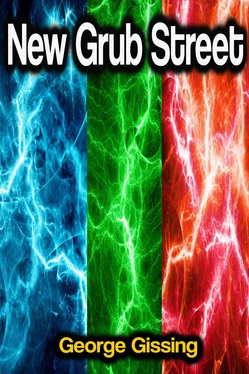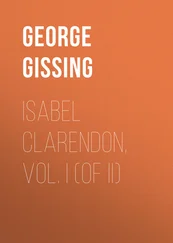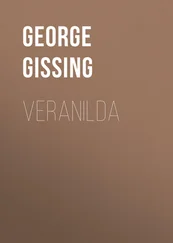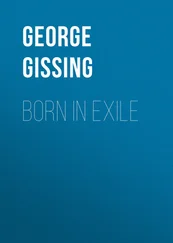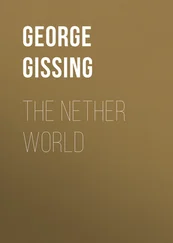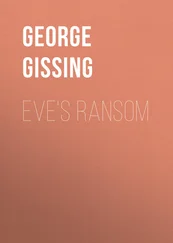George Gissing - New Grub Street
Здесь есть возможность читать онлайн «George Gissing - New Grub Street» — ознакомительный отрывок электронной книги совершенно бесплатно, а после прочтения отрывка купить полную версию. В некоторых случаях можно слушать аудио, скачать через торрент в формате fb2 и присутствует краткое содержание. Жанр: unrecognised, на английском языке. Описание произведения, (предисловие) а так же отзывы посетителей доступны на портале библиотеки ЛибКат.
- Название:New Grub Street
- Автор:
- Жанр:
- Год:неизвестен
- ISBN:нет данных
- Рейтинг книги:3 / 5. Голосов: 1
-
Избранное:Добавить в избранное
- Отзывы:
-
Ваша оценка:
- 60
- 1
- 2
- 3
- 4
- 5
New Grub Street: краткое содержание, описание и аннотация
Предлагаем к чтению аннотацию, описание, краткое содержание или предисловие (зависит от того, что написал сам автор книги «New Grub Street»). Если вы не нашли необходимую информацию о книге — напишите в комментариях, мы постараемся отыскать её.
New Grub Street — читать онлайн ознакомительный отрывок
Ниже представлен текст книги, разбитый по страницам. Система сохранения места последней прочитанной страницы, позволяет с удобством читать онлайн бесплатно книгу «New Grub Street», без необходимости каждый раз заново искать на чём Вы остановились. Поставьте закладку, и сможете в любой момент перейти на страницу, на которой закончили чтение.
Интервал:
Закладка:
Marian shook hands with him.
‘He went away at half-past two,’ was her reply to his question.
‘How annoying! I wanted particularly to see him. I have been running about all day, and couldn’t get here before. Something important—most important. At all events, I can tell you. But I entreat that you won’t breathe a word save to your father.’
Mr Quarmby—that was his name—had taken a vacant chair and drawn it close to Marian’s. He was in a state of joyous excitement, and talked in thick, rather pompous tones, with a pant at the end of a sentence. To emphasise the extremely confidential nature of his remarks, he brought his head almost in contact with the girl’s, and one of her thin, delicate hands was covered with his red, podgy fingers.
‘I’ve had a talk with Nathaniel Walker,’ he continued; ‘a long talk—a talk of vast importance. You know Walker? No, no; how should you? He’s a man of business; close friend of Rackett’s—Rackett, you know, the owner of The Study.’
Upon this he made a grave pause, and glared more excitedly than ever.
‘I have heard of Mr Rackett,’ said Marian.
‘Of course, of course. And you must also have heard that Fadge leaves The Study at the end of this year, eh?’
‘Father told me it was probable.’
‘Rackett and he have done nothing but quarrel for months; the paper is falling off seriously. Well, now, when I came across Nat Walker this afternoon, the first thing he said to me was, “You know Alfred Yule pretty well, I think?” “Pretty well,” I answered; “why?” “I’ll tell you,” he said, “but it’s between you and me, you understand. Rackett is thinking about him in connection with The Study.” “I’m delighted to hear it.” “To tell you the truth,” went on Nat, “I shouldn’t wonder if Yule gets the editorship; but you understand that it would be altogether premature to talk about it.” Now what do you think of this, eh?’
‘It’s very good news,’ answered Marian.
‘I should think so! Ho, ho!’
Mr Quarmby laughed in a peculiar way, which was the result of long years of mirth-subdual in the Reading-room.
‘But not a breath to anyone but your father. He’ll be here to-morrow? Break it gently to him, you know; he’s an excitable man; can’t take things quietly, like I do. Ho, ho!’
His suppressed laugh ended in a fit of coughing—the Reading-room cough. When he had recovered from it, he pressed Marian’s hand with paternal fervour, and waddled off to chatter with someone else.
Marian replaced several books on the reference-shelves, returned others to the central desk, and was just leaving the room, when again a voice made demand upon her attention.
‘Miss Yule! One moment, if you please!’
It was a tall, meagre, dry-featured man, dressed with the painful neatness of self-respecting poverty: the edges of his coat-sleeves were carefully darned; his black necktie and a skull-cap which covered his baldness were evidently of home manufacture. He smiled softly and timidly with blue, rheumy eyes. Two or three recent cuts on his chin and neck were the result of conscientious shaving with an unsteady hand.
‘I have been looking for your father,’ he said, as Marian turned. ‘Isn’t he here?’
‘He has gone, Mr Hinks.’
‘Ah, then would you do me the kindness to take a book for him? In fact, it’s my little “Essay on the Historical Drama,” just out.’
He spoke with nervous hesitation, and in a tone which seemed to make apology for his existence.
‘Oh, father will be very glad to have it.’
‘If you will kindly wait one minute, Miss Yule. It’s at my place over there.’
He went off with long strides, and speedily came back panting, in his hand a thin new volume.
‘My kind regards to him, Miss Yule. You are quite well, I hope? I won’t detain you.’
And he backed into a man who was coming inobservantly this way.
Marian went to the ladies’ cloak-room, put on her hat and jacket, and left the Museum. Some one passed out through the swing-door a moment before her, and as soon as she had issued beneath the portico, she saw that it was Jasper Milvain; she must have followed him through the hall, but her eyes had been cast down. The young man was now alone; as he descended the steps he looked to left and right, but not behind him. Marian followed at a distance of two or three yards. Nearing the gateway, she quickened her pace a little, so as to pass out into the street almost at the same moment as Milvain. But he did not turn his head.
He took to the right. Marian had fallen back again, but she still followed at a very little distance. His walk was slow, and she might easily have passed him in quite a natural way; in that case he could not help seeing her. But there was an uneasy suspicion in her mind that he really must have noticed her in the Reading-room. This was the first time she had seen him since their parting at Finden. Had he any reason for avoiding her? Did he take it ill that her father had shown no desire to keep up his acquaintance?
She allowed the interval between them to become greater. In a minute or two Milvain turned up Charlotte Street, and so she lost sight of him.
In Tottenham Court Road she waited for an omnibus that would take her to the remoter part of Camden Town; obtaining a corner seat, she drew as far back as possible, and paid no attention to her fellow-passengers. At a point in Camden Road she at length alighted, and after ten minutes’ walk reached her destination in a quiet by-way called St Paul’s Crescent, consisting of small, decent houses. That at which she paused had an exterior promising comfort within; the windows were clean and neatly curtained, and the polishable appurtenances of the door gleamed to perfection. She admitted herself with a latch-key, and went straight upstairs without encountering anyone.
Descending again in a few moments, she entered the front room on the ground-floor. This served both as parlour and dining-room; it was comfortably furnished, without much attempt at adornment. On the walls were a few autotypes and old engravings. A recess between fireplace and window was fitted with shelves, which supported hundreds of volumes, the overflow of Yule’s library. The table was laid for a meal. It best suited the convenience of the family to dine at five o’clock; a long evening, so necessary to most literary people, was thus assured. Marian, as always when she had spent a day at the Museum, was faint with weariness and hunger; she cut a small piece of bread from a loaf on the table, and sat down in an easy chair.
Presently appeared a short, slight woman of middle age, plainly dressed in serviceable grey. Her face could never have been very comely, and it expressed but moderate intelligence; its lines, however, were those of gentleness and good feeling. She had the look of one who is making a painful effort to understand something; this was fixed upon her features, and probably resulted from the peculiar conditions of her life.
‘Rather early, aren’t you, Marian?’ she said, as she closed the door and came forward to take a seat.
‘Yes; I have a little headache.’
‘Oh, dear! Is that beginning again?’
Mrs Yule’s speech was seldom ungrammatical, and her intonation was not flagrantly vulgar, but the accent of the London poor, which brands as with hereditary baseness, still clung to her words, rendering futile such propriety of phrase as she owed to years of association with educated people. In the same degree did her bearing fall short of that which distinguishes a lady. The London work-girl is rarely capable of raising herself, or being raised, to a place in life above that to which she was born; she cannot learn how to stand and sit and move like a woman bred to refinement, any more than she can fashion her tongue to graceful speech. Mrs Yule’s behaviour to Marian was marked with a singular diffidence; she looked and spoke affectionately, but not with a mother’s freedom; one might have taken her for a trusted servant waiting upon her mistress. Whenever opportunity offered, she watched the girl in a curiously furtive way, that puzzled look on her face becoming very noticeable. Her consciousness was never able to accept as a familiar and unimportant fact the vast difference between herself and her daughter. Marian’s superiority in native powers, in delicacy of feeling, in the results of education, could never be lost sight of. Under ordinary circumstances she addressed the girl as if tentatively; however sure of anything from her own point of view, she knew that Marian, as often as not, had quite a different criterion. She understood that the girl frequently expressed an opinion by mere reticence, and hence the carefulness with which, when conversing, she tried to discover the real effect of her words in Marian’s features.
Читать дальшеИнтервал:
Закладка:
Похожие книги на «New Grub Street»
Представляем Вашему вниманию похожие книги на «New Grub Street» списком для выбора. Мы отобрали схожую по названию и смыслу литературу в надежде предоставить читателям больше вариантов отыскать новые, интересные, ещё непрочитанные произведения.
Обсуждение, отзывы о книге «New Grub Street» и просто собственные мнения читателей. Оставьте ваши комментарии, напишите, что Вы думаете о произведении, его смысле или главных героях. Укажите что конкретно понравилось, а что нет, и почему Вы так считаете.
